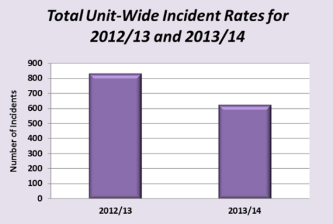
Reducing the number of incidents was identified as a key part of the hospital’s programme to further improve quality and safety. Over the last 12-18 months a number of initiatives have been put in place to help achieve this. These include:
- Introduction of START risk tool between July 2013 – December 2013 across the four wards – this provided an opportunity and enabled us to train all staff in risk assessment and management. It also enhanced and clarified the link between histories, threats, behaviours, risk categories, risk formulations, risk management plans and care planning.
- Training in the principles and concept of risk assessment and management was introduced in June 2013. The aim of the training was to give staff a better understanding of risk and risk management not just the tools for conducting risk assessment. This is now an integral part of our unit wide induction programme.
- A new unit-wide induction programme for all new staff was introduced September 2013. The induction sets the stage for new staff to be equipped before going on the wards. Modules include security awareness, key policies, relational security, search training and customer care with focus on the service user as ‘king customer’.
- The introduction of My Shared Pathway has increased collaborative working emphasizing service users as partners in their care delivery.
- A change to the handover system and a new template for nursing shift handover was introduced in August 2013 with emphasis on risk communication between shifts and staffs.
- Borderline Personality Disorder awareness training has been rolled across the unit for all staff. An overview of the patient population across the service showed a significant part were having borderline personality disorder as either a primary or secondary diagnosis and this group posed the most complex and challenging behaviour to nursing staff. The decision to provide awareness training to all clinical staff in this area was to support a more psychological and therapeutic approach to the management of this population.
- Specific Service Improvement Focus on Self- Harm reduction in 2013 (SDIP) – leading to development of strategies to reduce self-harm behaviours such as the introduction of the anti-ligature materials, improvement in understanding and application of intermittent observations, zonal observations, psychological minded coaching for staffs, recruitment of social therapists with psychology degree backgrounds, improvement in environmental management (searches).
- Specific incident reduction targets were set for ward managers – ward specific trainings on de-escalation techniques, proactive management, therapeutic risk taking and team working.
- Benchmarking: The work leading to programmes such as AIMS, STAR Wards and Low Secure Forensic Quality Network meant that services were benchmarked nationally leading to improvements in all areas including physical environment, therapy programme provision, security and safety, systems and processes and collaborative working with patients.
- Recruitment focused on identifying candidates with core values that are a ‘fit’ to the programme of Quality and Safety embarked upon at Beckton. A programme to fill all staff vacancies meant a continual reduction in bank and agency usage and increase in core staffing. Evidence suggests that high agency and bank usage correlates with increased incidents in an in-patient setting.
“Our strategic decision to make Cygnet Hospital Beckton a ‘Hospital of Choice’ for women of adult age with mental illness, personality disorder and learning disability is the key driver for a series of innovative ways of working. Bold initiatives in different areas of care delivery management and governance have ultimately enhanced the experience of service users, carers, commissioners and staff. This is also reflected in the reduced number of incidents on the wards.”Emmanuel Onukwube, Clinical Manager